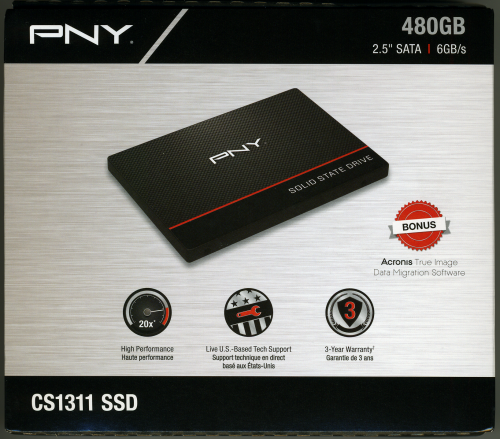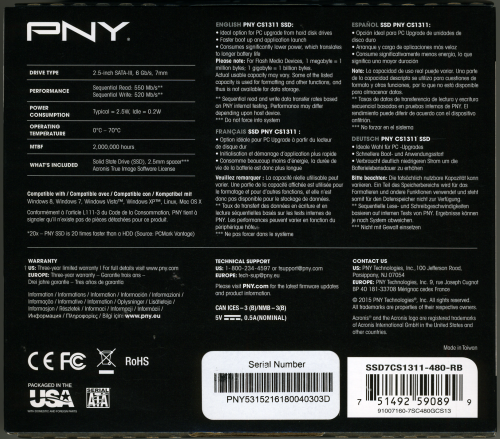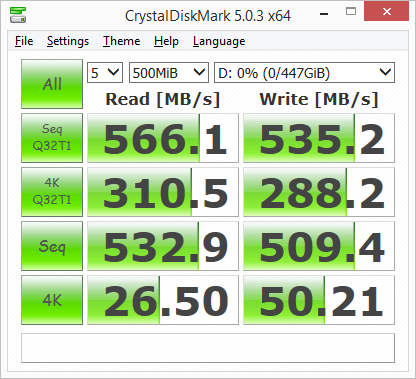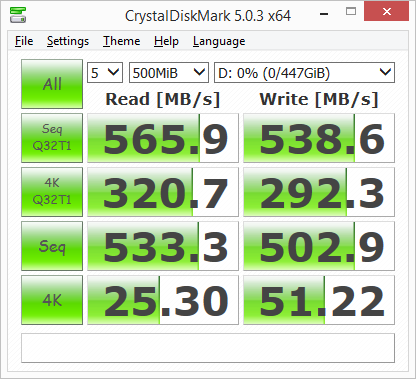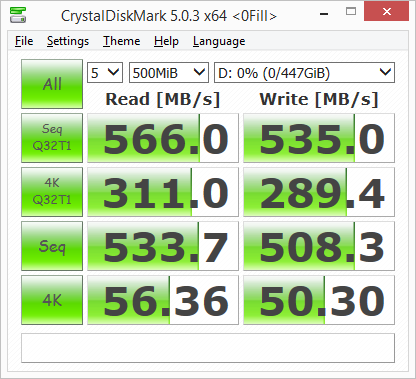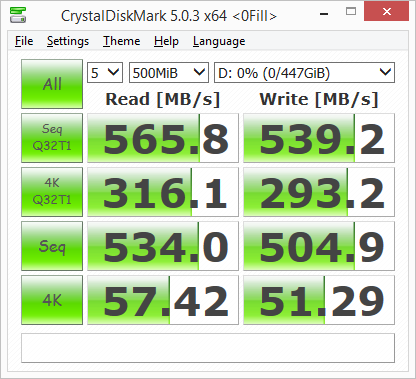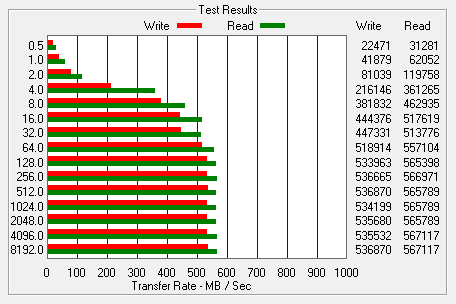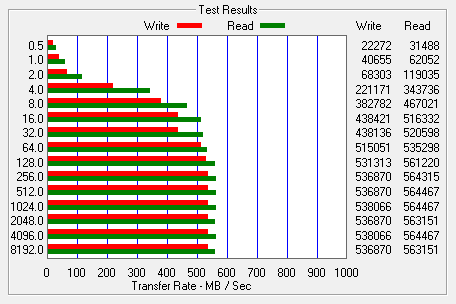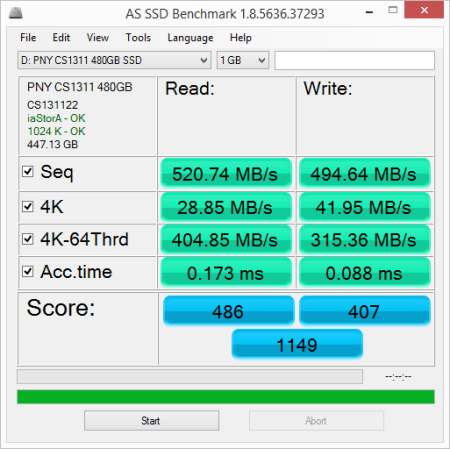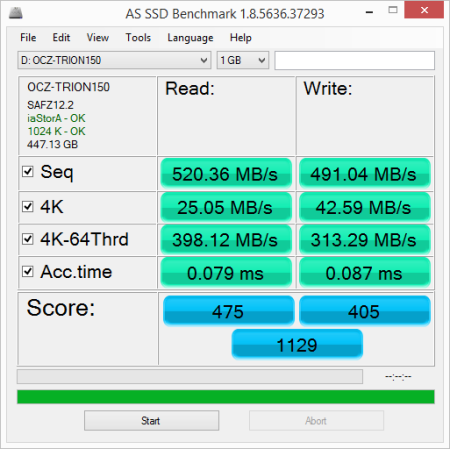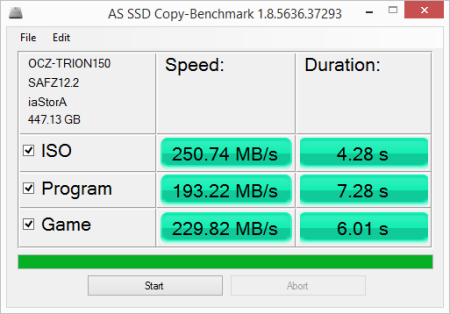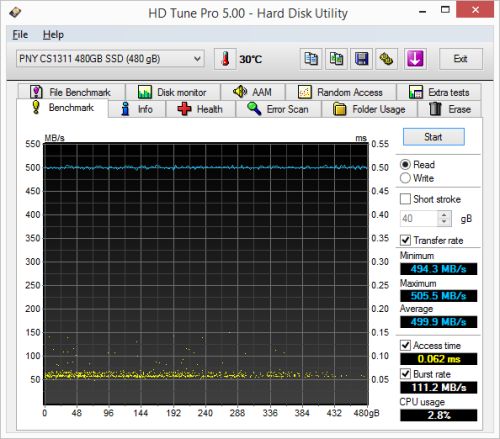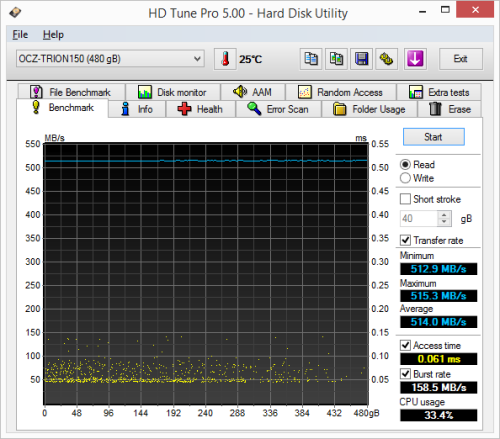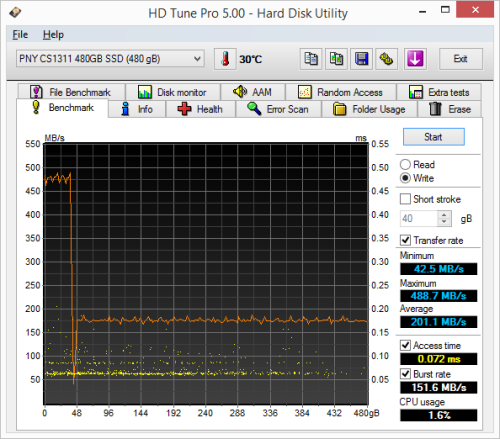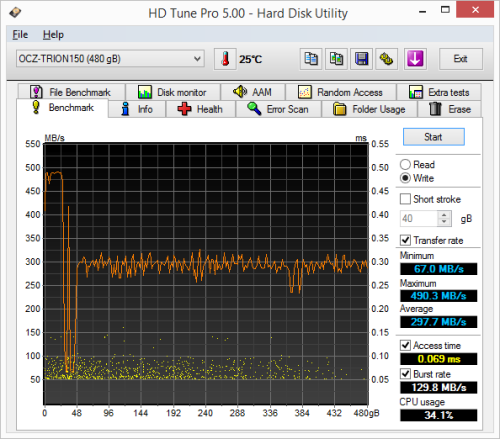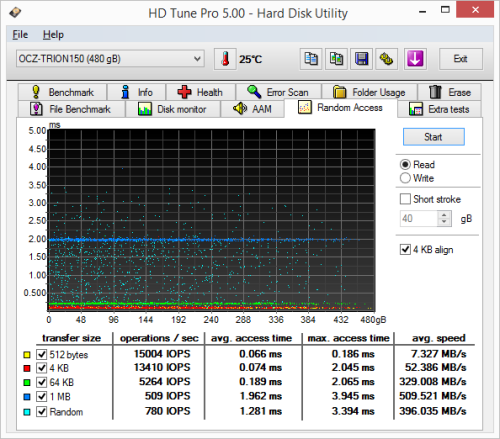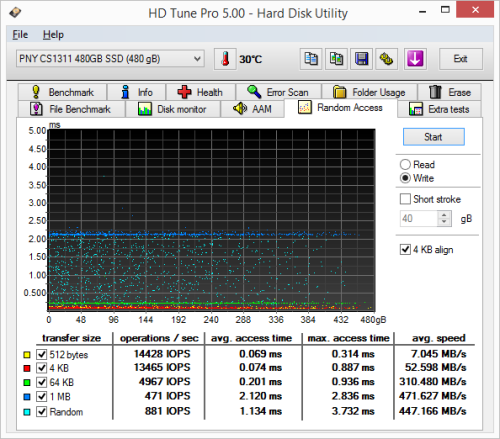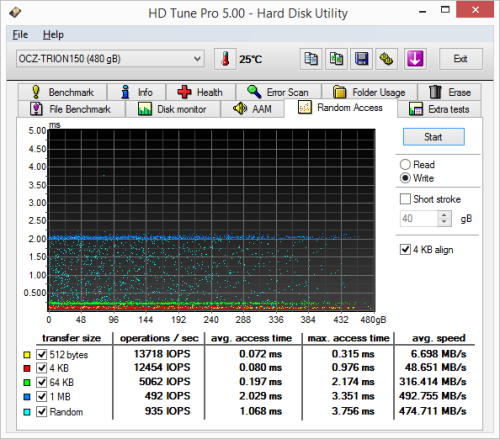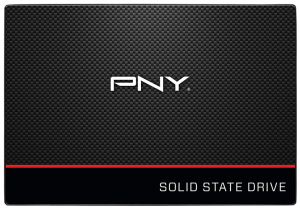

Model: PNY CS1311 480GB Solid State Drive
Manufacturer: PNY Technologies
Provided By: PNY Technologies
PNY Technologies is a global leader within the consumer electronics market. Established in 1985, this New Jersey-based company started out by buying and selling memory chips. As time went on, PNY expanded its operations to include manufacturing new forms of memory and complementary products. Today, the company continues to evolve by delivering a full spectrum of high-quality products. In addition to PC memory upgrades, PNY designs, manufacturers and supplies USB flash drives, memory cards, solid state drives, mobile accessories and NVIDIA graphics cards for the consumer, commercial and OEM markets.
Like many manufacturers, PNY has its sights set on the growing solid-state drive (SSD) market. Earlier this year, the company introduced two new consumer SSDs. In addition to the enthusiast-oriented CS2211, PNY unveiled the latest addition to its value performance line, the CS1311. Designed for the cost-conscious consumer looking to upgrade their laptop or desktop computer, the CS1311 combines Phison's quad-core, eight-channel PS3110-S10 controller with Toshiba's 15nm TLC NAND flash to deliver faster boot times, quicker application launches and better overall system performance. The CS1311 is also highly durable and offers cool, quiet operation and low power consumption for longer battery life.
The CS1311 is available in 120GB, 240GB, 480GB and 960GB capacities. For this review, PNY sent us the 480GB version of the drive which is capable of delivering up to 565 MB/s sequential read and 520 MB/s sequential write speeds as well as up to 90,000 random read and write IOPS.
| PNY CS1311 480GB Solid State Drive | |||||||||||||||||||||||||||||||||||||||
General Specifications
Performance
Reliability
Power Consumption
Environmental
Dimensions and Weight
Other Features
|
Needless to say, this is only a taste of what the CS1311 has to offer. To give you an idea of what to expect, we'll take a closer look at PNY's new SSD and then see how well it performs. Does the CS1311 have what it takes? More importantly, is it the best bang for your buck? Keep reading as we find out.
The CS2211 comes in a small, black and white box. Along with a picture of the drive, the front advertises a number of its key features including its 480GB capacity, 2.5-inch form factor, SATA 6Gbps interface and 3 year warranty. The back of the box provides a bit more information regarding its features and specifications.
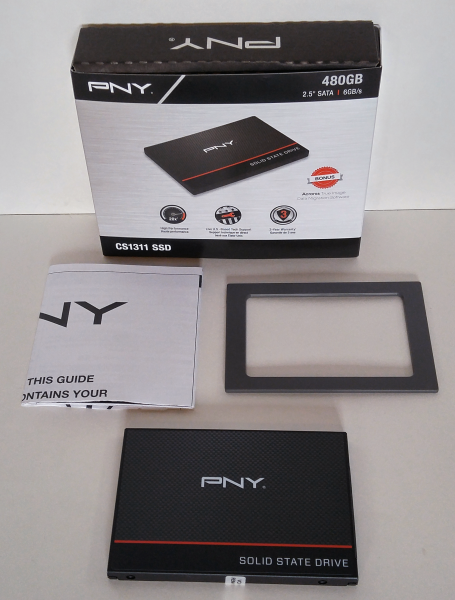
PNY doesn't include a lot of extras with the CS1311. In addition to the SSD, the box contains a mounting spacer for use with traditional 9.5mm drive bays as well as a small, fold out guide with instructions on how to download, install and activate the included Acronis data migration software.
Physical Features:
Like PNY's other SSDs, the CS1311 is very well constructed. The outer casing is made entirely out of metal and is covered by a nice, matte black finish. The top of the drive is also covered by a large black and red sticker with a white "PNY" logo on it
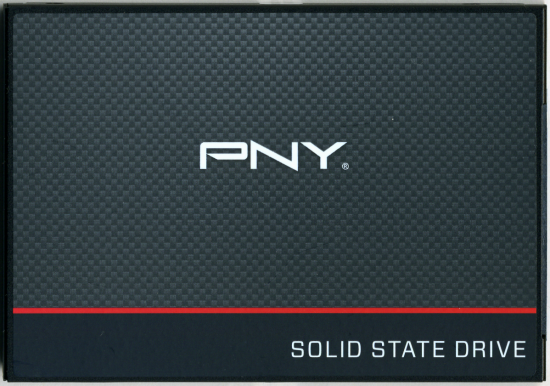
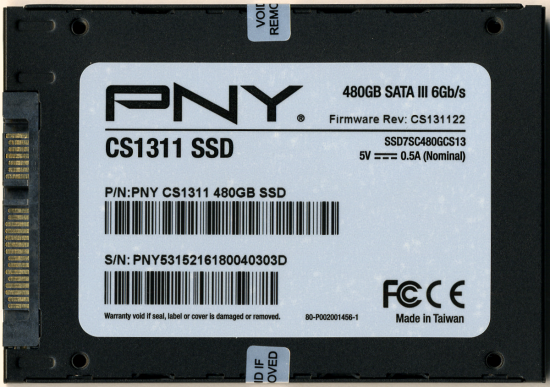
Like the CS2211, the CS1311 uses Phison's PS3110-S10 controller chip. The PS3110-S10 is powered by a quad-core CPU and supports up to 8 NAND flash channels as well as features like end-to-end data path protection, SmartECC error correction and AES encryption. The controller also supports Device Sleep (DEVSLP) but for whatever reason it is not enabled on the CS1311.

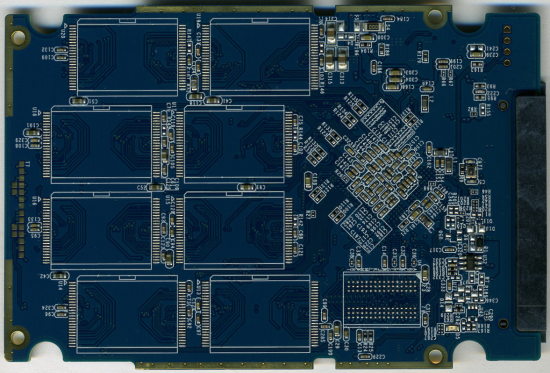
For the CS1311, PNY opted to use Toshiba's 15nm TLC NAND flash. Looking at the pictures above, you can see that there are eight 64GB NAND flash packages on the top of the PCB. The drive also has a single 512MB NANYA DDR3L SDRAM memory chip that is used for caching and garbage collection.
The test system used in this review was an HP 8200 Elite. The computer came equipped with an Intel Core i5-2400 CPU, 4GB of DDR3 1333MHz memory, Seagate Barracuda 7200.12 ST3250312AS 250GB SATA 6 Gb/s hard drive, NVIDIA Quadro FX580 512MB PCIe graphics card and an Intel 82579-LM gigabit network card. For the operating system, I installed a fresh copy of Windows 8.1 Enterprise.
To test the performance of PNY's CS1311 SSD, I ran a series of benchmarks using CrystalDiskMark 3.0.3, HD Tach RW 3.0.4.0, ATTO Disk Benchmark 2.46, AS SSD, HD Tune Pro 5.00, Anvil's Storage Utilities, Iometer and PCMark 8. For comparison, I've also included test results from the OCZ Trion 150, PNY CS2211, Plextor M6V, Crucial BX200, OCZ Trion 100, Kingston HyperX Savage, Crucial MX200, OCZ Vector 180, Kingston BX100, Samsung 850 EVO M.2, Samsung 850 EVO mSATA, AMD Radeon R7, Silicon Power Slim S80, Samsung SSD 850 EVO, OCZ ARC 100, SanDisk Ultra II, Kingston MX100, SanDisk Extreme Pro, Samsung SSD 850 PRO, Plextor PX-256M6S and Toshiba Q Series Pro.
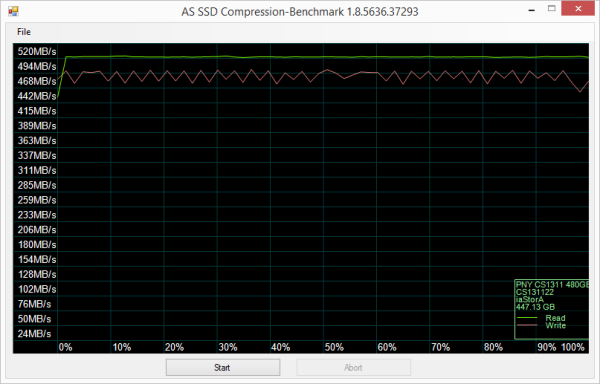
As I mentioned earlier, the CS1311 is based on Phison's PS3110-S10 controller chip. Looking at the screenshot above, you can see that it performs equally well with both incompressible (0%) and compressible (100%) data.
CrystalDiskMark 3.0.3:
First, I ran a few quick tests using CrystalDiskMark. This benchmark tool measures the performance of a storage device by testing its sequential read and write speeds as well as its random read and write speeds using blocks 512K and 4K in size.
According to PNY, the 480GB CS1311 is capable of reading at 565 MB/s and writing at 520 MB/s when connected to a SATA 6 Gb/s port. Looking at the screenshot above, you can see that the drive had no problems reaching these speeds in CrystalDiskMark's sequential read and write tests.
The CS1311 performed equally well when using highly compressible 0x00 (0 Fill) data. This time around, the drive was able to read at 566 MB/s and write at 535 MB/s.
HD Tach RW 3.0.4.0:
Next, I used HD Tach to test the CS1311's read, write and burst speeds as well as its seek times and CPU usage.
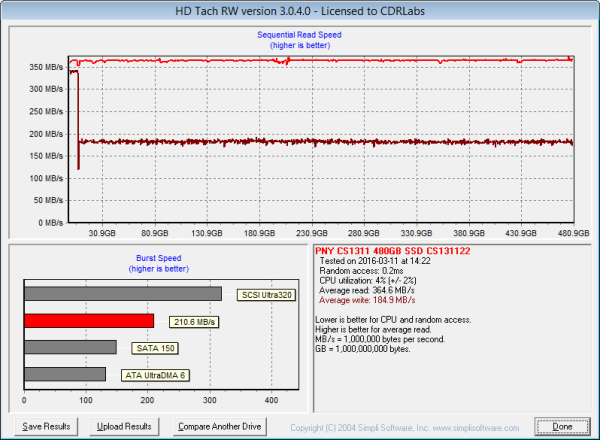
Looking at the screenshot above, you can see that the CS1311 had average read and write speeds of 364.6 MB/s and 184.9 MB/s respectively, as well as a burst speed of 210.6 MB/s. The screenshot also shows that, like most other TLC-based SSDs, the CS1311 uses some sort of SLC caching. The drive starts writing at about 345 MB/s and then drops to about 190 MB/s when the write operation exceeds the size of the cache.
ATTO Disk Benchmark 2.46:
I also used ATTO Disk Benchmark to test the CS1311's sequential read and write speeds. The tests are run using blocks ranging in size from 0.5KB to 8192KB and the total length set to 256MB.
When tested with ATTO, the CS1311's read speeds topped out at about 567 MB/s and its write speeds at 536 MB/s.
AS SSD:
AS SSD is a relatively new benchmark designed specifically for solid state drives. The application contains five synthetic tests used to determine the sequential and random read and write performance of a drive.
AS SSD also includes a copy benchmark. This test copies an ISO (two large files), program (many small files) and game (small and large files), returning the speed and duration of each.
HD Tune Pro 5.00:
Next, I ran a series of tests using HD Tune Pro. This hard disk utility measures a drive's performance by testing its sequential read and write speeds as well as its access time, burst rate and CPU usage. For this review, I'm also going to use it to benchmark the CS1311's random read and write speeds, random access times and the number of operations per second.
The CS1311 performed relatively well when benchmarked with HD Tune. The drive had average read and write speeds of 499.9 MB/s and 201.1 MB/s, respectively, and a burst rate of 111.2 MB/s when reading.
When reading 4KB blocks, the CS1311 reached 12,203 IOPS and had an average speed of 47.671 MB/s. The drive was a bit faster when reading, reaching 13,465 IOPS with an average speed of 52.598 MB/s.
Anvil's Storage Utilities:
Anvil's Storage Utilities is another new benchmark designed with SSDs in mind. The standard storage benchmark measures a drive's performance by testing its transfer speeds, access times and IOPS.
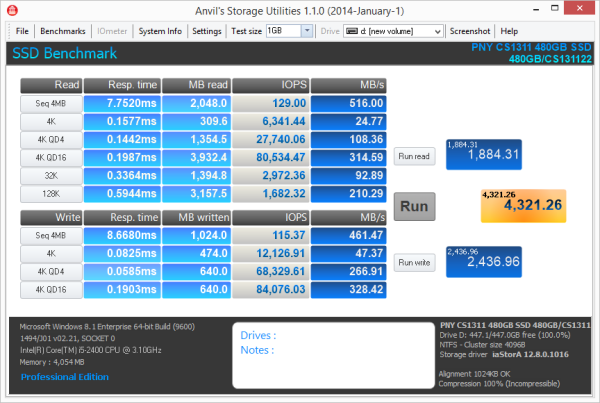
Iometer:
Lastly, I ran a series of tests using Iometer. This tool can be configured to benchmark a number of things. In this case, I used it to measure the CS1311's read and write speeds and the number of operations per second. The tests were run using random bytes and a queue depth of 3.
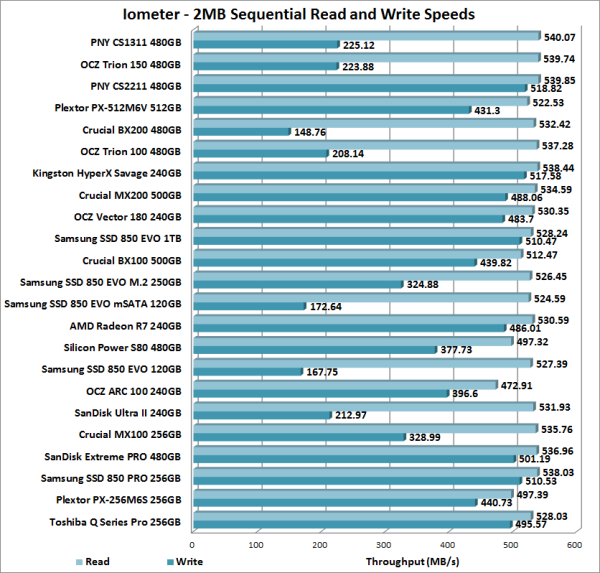
The CS1311's performance was hit and miss when tested with Iometer. While the drive was able to read at an impressive 540.07 MB/s, its sequential write speed averaged out at only 225.12 MB/s.
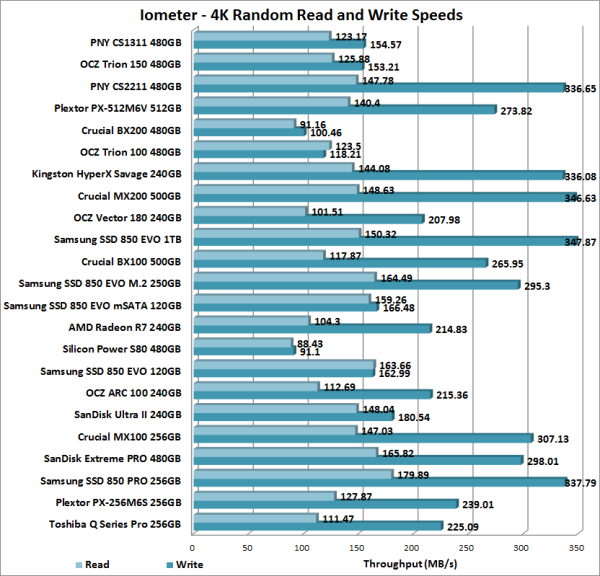
The CS1311 wasn't one of the faster drives we've tested when it came to random reads and writes. In our tests, the drive was able to read at 123.17 MB/s and write at 154.57 MB/s.
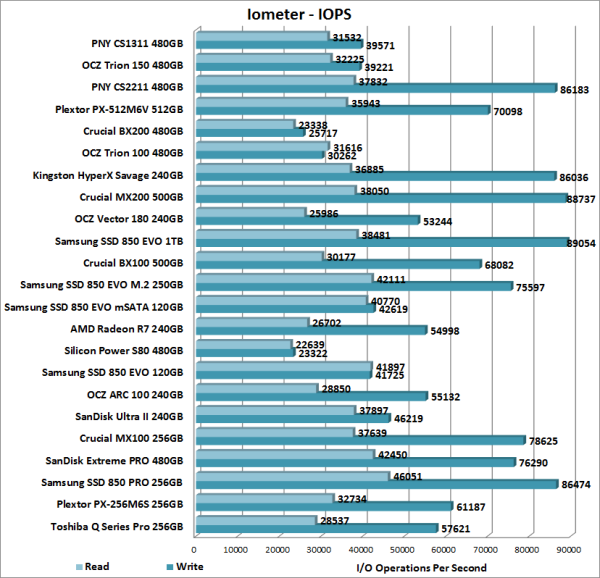
According to PNY, the 480GB CS1311 is capable of delivering a maximum of 95,000 IOPS when reading and writing 4K blocks. In our tests, the drive reached 31,532 random read IOPS and 39,571 random write IOPS. Increasing the queue depth had little impact on the CS1311's random write performance. However, with the queue depth set to 32, the drive was able to reach 81,841 random read IOPS.
Vantage PCMark 8 - Storage Test:
PCMark 8 is a complete benchmark for Windows. It includes five benchmark tests, each designed around a specific scenario. The storage benchmark measures drive performance using real-world traces recorded from Adobe Creative Suite, Microsoft Office and a selection of popular games.

PCMark 8 also includes a consistency test which measures the performance consistency and degradation tendency of a storage system. The test reports the performance level at the start, the degraded steady-state and the recovered state as well as the number of iterations required to reach the degraded state and the recovered state. For this test, we are focusing on the Adobe Photoshop (Heavy) trace and will look at both the bandwidth and latency of the drive
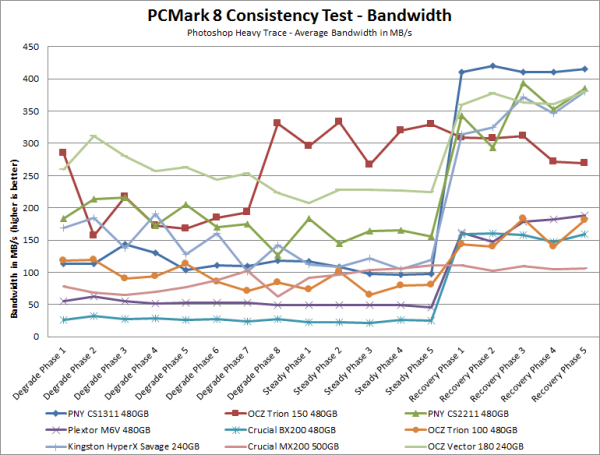
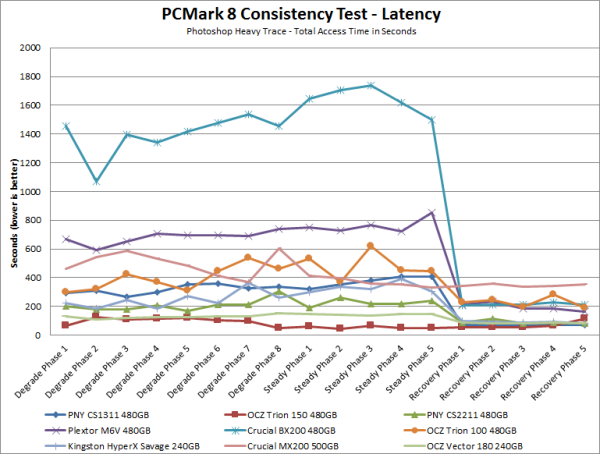
The CS1311 did fairly well throughout PCMark's consistency test. While not as fast as the Trion 150, it performed better than the M6V and BX200 throughout the degradation and steady state phases. More importantly, the CS1311 had no problems bouncing back during the recover phase.
TRIM Performance:
While SSD's offer many benefits, there are some downsides to using flash memory. One of the biggest issues people run into is performance degradation. Over time, an SSD will run out of fresh blocks and will have to write over data the file system has marked as deleted. This procedure is very complicated and can slow an SSD's write speeds considerably.
To fix this problem, most manufacturers have added TRIM support to their SSDs. The TRIM command allows an operating system, such as Windows 7, to tell an SSD which data blocks are no longer in use. Using this information, the drive pro-actively erases these blocks and adds them to the free block pool.
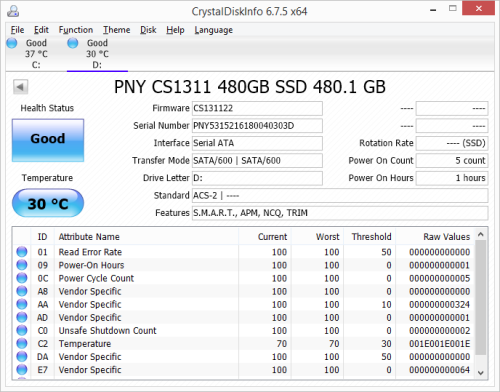
To test the CS1311's TRIM and garbage collection functions, I first put the drive in a "dirty" state. I used Iometer to fill the entire drive and then ran a random write test for 30 minutes. Looking at the screenshot below, you can see that the CS1311's average read and write speeds dropped to 249.6 MB/s and 80.7 MB/s, respectively.
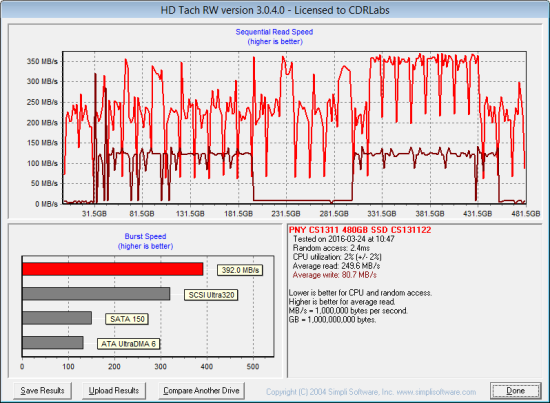
PNY CS1311 - Dirty
To see how well the CS1311 could recover, I let the computer sit for about an hour and then reran the test. The drive's average read speed climbed up to 367.0 MB/s. However, its read speed lagged behind, averaging out at 249.3 MB/s.
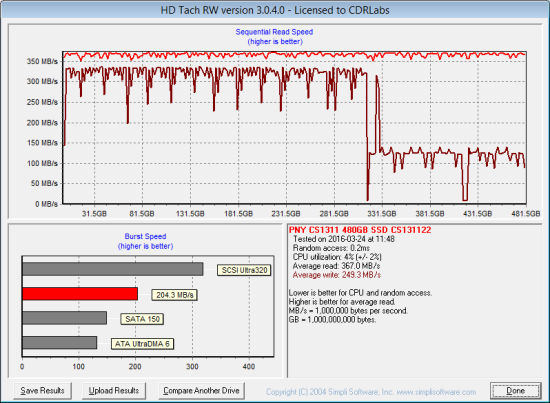
PNY CS1311 - After TRIM
Lastly, I used Parted Magic to perform a secure erase on the CS1311. With the drive wiped clean, it had average read and write speeds of 368.2 MB/s and 312.2 MB/s, respectively.
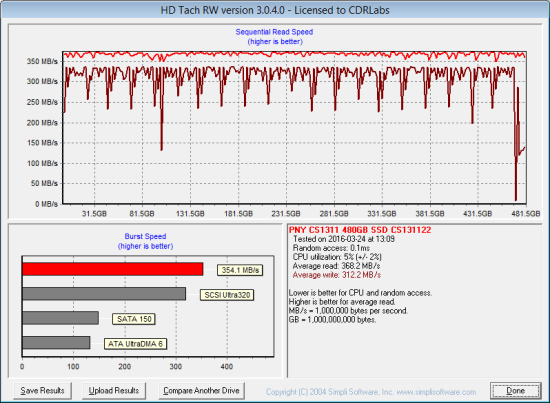
PNY CS1311 - Secure Erased
Final Thoughts:
While not the fastest or most feature packed SSD to come through the 'Labs, the PNY CS1311 delivers a lot of bang for your buck. Powered by the same quad-core, eight-channel Phison PS3110-S10 controller as the CS2211, the CS1311 uses Toshiba's 15nm TLC NAND to provide an easy and affordable way for consumers to improve the performance of their laptop or desktop computer. In our sequential read and write tests, the 480GB version of the CS1311 was able to read at speeds as high as 567 MB/s and write at speeds in excess of 535 MB/s. It also had no problems holding its own when doing random reads, but lagged behind other drives in our random write tests, producing a little more than 39,000 IOPS at low queue depths.
Like most TLC-based SSDs, the CS1311 does have its limitations. To compensate for the slow write speeds typically associated with this type of NAND, the drive employs a form of SLC caching. Using this cache, the CS1311 is able to maintain peak performance under normal workloads. However, once a consecutive write operation exceeds the size of the cache and you make the transition to TLC NAND, its write speed drops considerably. It's unlikely that you will ever run into this situation if your computer is used primarily for web browsing or word processing, but, if you have heavier workloads, you may want to consider PNY's CS2211 SSD.
The CS1311 is available now in 120GB, 240GB, 480GB and 960GB capacities. Prices on Amazon.com and PNY.com currently range from $40 up to $240, with the 480GB version reviewed here retailing for about $120.
Highs:
- Available in 120GB, 240GB, 480GB and 960GB capacities
- Phison PS3110-S10 controller
- Good sequential read and write speeds under most conditions
- Performs equally well with compressible and incompressible data
- SATA 6Gb/s interface
- Good looking and well constructed design
- Includes 9.5mm adapter and Acronis data migration software
- Reasonably priced
- 3 year warranty
Lows:
- Mediocre random write performance
- Write speed drops when SLC cache is full
- Does not support hardware based encryption
- Does not support DEVSLP
